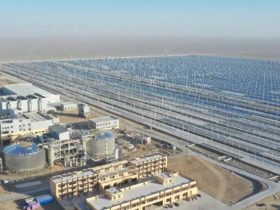Powering the entire world by renewables is not possible at the moment, however, what may seem as a fantasy now, could soon become a reality. A collaborative team of scientists has just demonstrated that this dream is theoretically feasible if we can accumulate global buy-in.
A newly published research in the international journal ‘Energies‘, led by Prof. James Ward from South Australia co-authored by a team including Luca Coscieme from Trinity College Dublin, explains how is it possible to power the entire planet by sustainable energy resources.
The study is conductued based on world’s current population numbers and explores what changes are required in our energy mix and technologies, and in our energy consumption if we are to achieve 100% sustainable energy in a way that supports everyone. The study states that, further population growth will inevitably increase the burden on the world’s forests and make a renewable energy future proportionally more difficult to attain and sustain.
The fully renewable energy-powered future envisioned by the team would need a remarkable ‘electrification’ of our energy mix and raises key questions about the potential conflict between land demands for renewable fuel production. Luca Coscieme, the research fellow in Trinity’s School of Natural Sciences, explained thier work in details:
“Firstly, the high fuel needs of today’s high-income countries would have to be reduced as it would require an unsustainably vast amount of land to be covered with biomass plantations if we were to produce enough fuel to satisfy the same levels.”
“Additionally, our research shows that we would need to radically ‘electrify’ the energy supply of such countries—including Ireland—with the assumption that these changes could supply 75% of society’s final energy demands. We would also need to adopt technology in which electricity is used to convert atmospheric gases into synthetic fuels.”
“We very much hope that the approach designed in this research will inform our vision of sustainable futures and also guide national planning by contextualizing energy needs within the broader consumption patterns we see in other countries with energy and forest product consumption profiles that—if adopted worldwide—could theoretically be met by high-tech renewably derived fuels. Countries such as Argentina, Cyprus, Greece, Portugal and Spain are great examples in this regard.”
“Even so, the success of this green ideal will be highly dependent on major future technological developments, in the efficiency of electrification and in producing and refining new synthetic fuels. Such a scenario is still likely to require the use of a substantial—albeit hopefully sustainable—fraction of the world’s forest areas.”
In summary, according to the study, this analysis maybe possible (i) depending on the worldwide adoption of consumption patterns typical of several key exemplar countries; (ii) is highly dependent on major future technological development, such as radical electrification of the energy supply and the development of synthetic fuels; and (iii) is still likely to require appropriation of a substantial, but hopefully sustainable, fraction of the world’s forest area or potentially an equivalent area of land of lower bio-productivity.




![Types of Engineers and What they Do [Explained]](https://www.engineeringpassion.com/wp-content/uploads/2022/04/types-of-engineers-and-what-they-do-280x210.jpg)








Leave a Reply